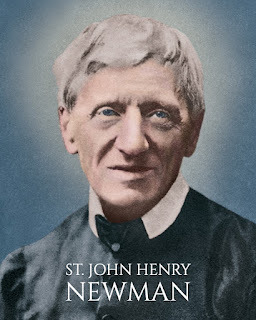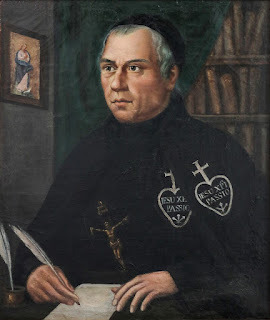Preview: The 180th Anniversary of Newman's Conversion
 Next Thursday, October 9, is Saint John Henry Newman's Feast Day, celebrated as a Feast at Masses in England and as an Obligatory Memorial here in the USA in the Anglican Ordinariate of the Chair of St. Peter, so naturally the anniversary of his conversion to Catholicism is the next 2025 Anniversary to celebrate on the Son Rise Morning Show!
Next Thursday, October 9, is Saint John Henry Newman's Feast Day, celebrated as a Feast at Masses in England and as an Obligatory Memorial here in the USA in the Anglican Ordinariate of the Chair of St. Peter, so naturally the anniversary of his conversion to Catholicism is the next 2025 Anniversary to celebrate on the Son Rise Morning Show! I'll be on the air Monday, October 6 at my usual time 7:50 a.m. Eastern/6:50 a.m. Central to discuss this anniversary and its importance. Please listen live here or catch the podcast later here.
Newman had been living in Littlemore outside of Oxford with several followers since April 19, 1842. He had preached his last sermon as an Anglican minister, "The Parting of Friends" on September 25, 1843, and had gradually been cutting his ties to Oxford--especially since he'd moved all his books to Littlemore! The impetus for his final decision to become a Roman Catholic was the coming of the Passionist priest (now Blessed) Dominic Barberi to Littlemore. One of his biographers, William Ward, demonstrates how Newman proceeded once he knew of the opportunity:
On October 3 he addressed a letter to the Provost of Oriel resigning his Fellowship. On the same day he wrote to Pusey informing him of this act, and adding, 'anything may happen to me now any day.'
On October 5 he notes in his diary, 'I kept indoors all day preparing for general confession.' [Edward] Oakeley was with W. G. Ward at Rose Hill, and dined with Newman that evening. On October 7 [Ambrose] St. John returned to Littlemore, and Newman had with him when he took the great and solemn step the one disciple to whom he habitually opened his whole mind. On this day he wrote thus to Henry Wilberforce [who hoped that Newman would delay any final action until Advent or Christmas]:
Littlemore: October 7, 1845.
'My dearest H. W.,—Father Dominic the Passionist is passing this way, on his way from Aston in Staffordshire to Belgium, where a chapter of his Order is to be held at this time. He is to come to Littlemore for the night as a guest of one of us [William Dalgairns] whom he has admitted at Aston. He does not know of my intentions, but I shall ask of him admission into the One true Fold of the Redeemer. I shall keep this back till after it is all over. . . .
'Father Dominic has had his thoughts turned to England from a youth, in a distinct and remarkable way. For thirty years he has expected to be sent to England, and about three years since was sent without any act of his own by his superior. . . . It is an accident his coming here, and I had no thoughts of applying to him till quite lately, nor should, I suppose, but for this accident.
'With all affectionate thoughts to your wife and children and to yourself,
I am, my dear H. W.,
Tuus usque ad cineres,
J. H. N.'
Newman refers to Father Barberi's visit to Littlemore as "an accident"; we might associate the word "accident" with a catastrophic event, like a car wreck or a fall, and the most common synonyms for accident reflect that (disaster, mishap, catastrophe, etc.), even though that is its secondary meaning.
 Newman means "accident" as the word derives from Latin: "accident-, accidens "chance event, contingent attribute", according to Merriam-Webster. He had wanted to make his final decision after his study of Church History in the Essay on the Development of Christian Doctrine was published, so that his actions would have some explanation. But since Father Barberi was coming to Littlemore, Newman prepared to be received into the Catholic Church.
Newman means "accident" as the word derives from Latin: "accident-, accidens "chance event, contingent attribute", according to Merriam-Webster. He had wanted to make his final decision after his study of Church History in the Essay on the Development of Christian Doctrine was published, so that his actions would have some explanation. But since Father Barberi was coming to Littlemore, Newman prepared to be received into the Catholic Church.As Ward explains:
On the evening of October 8 Father Dominic was expected, and almost at the same time [Richard] Stanton, who had been absent for a few weeks, returned. Father Dominic was to arrive at Oxford by the coach in the afternoon. Up to the very day itself Newman did not speak to the community at Littlemore of his intention. Dalgairns and St. John were to meet the Passionist Father in Oxford. The former has left the following account of what passed:
'At that time all of us except St. John, though we did not doubt Newman would become a Catholic, were anxious and ignorant of his intentions in detail. About 3 o'clock I went to take my hat and stick and walk across the fields to the Oxford "Angel" where the coach stopped. As I was taking my stick Newman said to me in a very low and quiet {94} tone: "When you see your friend, will you tell him that I wish him to receive me into the Church of Christ?" I said: "Yes" and no more. I told Fr. Dominic as he was dismounting from the top of the coach. He said: "God be praised," and neither of us spoke again till we reached Littlemore.'
And note that others took advantage of this happy accident of Father Barberi stopping in Littlemore on his way to Belgium:
It was then pouring with rain. Newman made his general confession that night, and was afterwards quite prostrate. Ambrose St. John and Stanton helped him out of the little Oratory. On the morrow his diary has this record: 'admitted into the Catholic Church with [Frederick] Bowles and Stanton.' Next day Newman made his first communion in the Oratory at Littlemore, in which Mass was said for the first time, and Father Dominic received Mr. and Mrs. Woodmason and their two daughters. Newman walked into Oxford in the afternoon with St. John to see Mr. Newsham, the Catholic priest. On the eleventh Father Dominic left. On the same day Newman paid a visit to W. G. Ward at Rose Hill, and Charles Marriott came to see him at Littlemore [Note 9].
Thus very quietly and without parade took place the great event dreamt of for so many years—with dread at first, in hope at last.
When I visited the Newman Centre at Littlemore in 2010, our guide, one of the Sisters of the Spiritual Family the Work, showed us the letters Newman wrote to his sisters and others on October 9, 1845 telling them of this "great event" and also a stole of Blessed Dominic Barberi's in a glass case. The Littlemore Newman Centre and the Birmingham Oratory are the major shrines to Newman in England, and I'm glad I went to at least one of them, perhaps the most important because of the date of his conversion, his feast day. He died in Birmingham on April 11, 1890, Saint Clare of Assisi's feast day.
Blessed Dominic Barberi, pray for us!
Saint John Henry Newman, pray for us!



